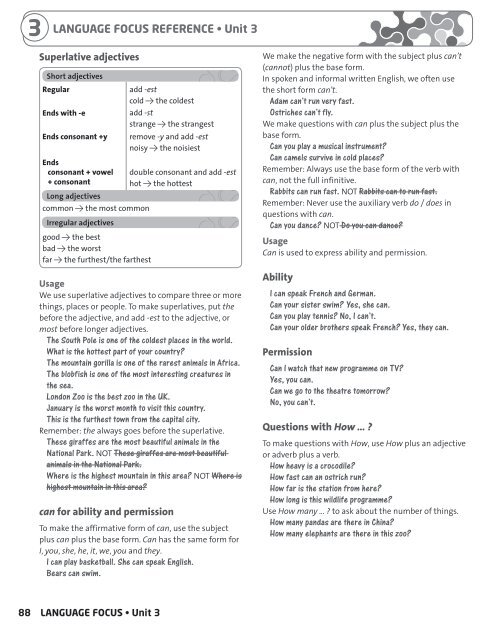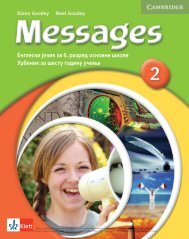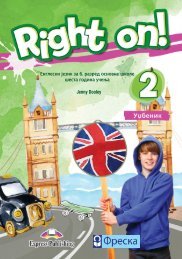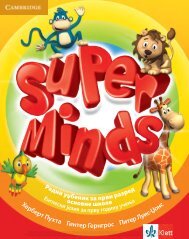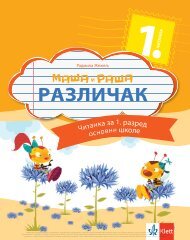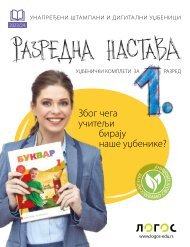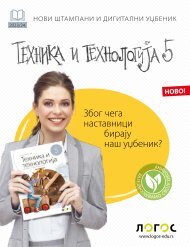Нови Логос, Еnglish plus 1, radna sveska
- No tags were found...
You also want an ePaper? Increase the reach of your titles
YUMPU automatically turns print PDFs into web optimized ePapers that Google loves.
3<br />
LANGUAGE FOCUS REFERENCE • Unit 3<br />
Superlative adjectives<br />
Short adjectives<br />
Regular<br />
Ends with -e<br />
Ends consonant +y<br />
Ends<br />
consonant + vowel<br />
+ consonant<br />
Long adjectives<br />
common → the most common<br />
Irregular adjectives<br />
good → the best<br />
bad → the worst<br />
far → the furthest/the farthest<br />
add -est<br />
cold → the coldest<br />
add -st<br />
strange → the strangest<br />
remove -y and add -est<br />
noisy → the noisiest<br />
Usage<br />
We use superlative adjectives to compare three or more<br />
things, places or people. To make superlatives, put the<br />
before the adjective, and add -est to the adjective, or<br />
most before longer adjectives.<br />
The South Pole is one of the coldest places in the world.<br />
What is the hottest part of your country?<br />
The mountain gorilla is one of the rarest animals in Africa.<br />
The blobfish is one of the most interesting creatures in<br />
the sea.<br />
London Zoo is the best zoo in the UK.<br />
January is the worst month to visit this country.<br />
This is the furthest town from the capital city.<br />
Remember: the always goes before the superlative.<br />
These giraffes are the most beautiful animals in the<br />
National Park. NOT These giraffes are most beautiful<br />
animals in the National Park.<br />
Where is the highest mountain in this area? NOT Where is<br />
highest mountain in this area?<br />
can for ability and permission<br />
double consonant and add -est<br />
hot → the hottest<br />
To make the affirmative form of can, use the subject<br />
<strong>plus</strong> can <strong>plus</strong> the base form. Can has the same form for<br />
I, you, she, he, it, we, you and they.<br />
I can play basketball. She can speak English.<br />
Bears can swim.<br />
We make the negative form with the subject <strong>plus</strong> can’t<br />
(cannot) <strong>plus</strong> the base form.<br />
In spoken and informal written English, we often use<br />
the short form can’t.<br />
Adam can’t run very fast.<br />
Ostriches can’t fly.<br />
We make questions with can <strong>plus</strong> the subject <strong>plus</strong> the<br />
base form.<br />
Can you play a musical instrument?<br />
Can camels survive in cold places?<br />
Remember: Always use the base form of the verb with<br />
can, not the full infinitive.<br />
Rabbits can run fast. NOT Rabbits can to run fast.<br />
Remember: Never use the auxiliary verb do / does in<br />
questions with can.<br />
Can you dance? NOT Do you can dance?<br />
Usage<br />
Can is used to express ability and permission.<br />
Ability<br />
I can speak French and German.<br />
Can your sister swim? Yes, she can.<br />
Can you play tennis? No, I can’t.<br />
Can your older brothers speak French? Yes, they can.<br />
Permission<br />
Can I watch that new programme on TV?<br />
Yes, you can.<br />
Can we go to the theatre tomorrow?<br />
No, you can’t.<br />
Questions with How … ?<br />
To make questions with How, use How <strong>plus</strong> an adjective<br />
or adverb <strong>plus</strong> a verb.<br />
How heavy is a crocodile?<br />
How fast can an ostrich run?<br />
How far is the station from here?<br />
How long is this wildlife programme?<br />
Use How many … ? to ask about the number of things.<br />
How many pandas are there in China?<br />
How many elephants are there in this zoo?<br />
88 LANGUAGE FOCUS • Unit 3


